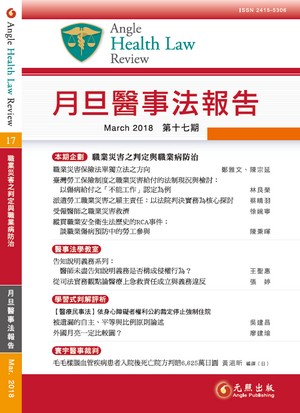臺灣勞工保險制度之職業災害給付的法制現況與檢討:以傷病給付之「不能工作」認定為例【本期企劃】 試閱
Discussions of Compensation for Occupational Accidents under the Current Labor Insurance Law: Recognition of Compensation for “Injuries and Sicknesses” Based on “Inability to Work”
勞工保險條例係為自1958年頒布施行以來,對勞工而言是最重要的社會保險制度之一,該勞工保險職業災害保險給付之主要項目包括醫療、傷病、失能、死亡給付等。就現行職業災害制度之運作,實務上存在不少爭議問題,其中尤其包括傷病與失能給付等之認定。本文以「傷病給付」於實務上如何認定之爭議為例,說明現行法律適用上之疑義及制度上之功能檢討,並就勞工保險條例第34條所定之所謂「不能工作」要件於實務上如何操作加以說明並解釋其爭議。此外,亦參考日本相關職業災害法制,介紹該國對於工作不能認定之規範與判斷標準。
The Labor Insurance Law has been one of the most important social security policies for workers, since it was announced in 1958. The workers?compensation covers areas such as injuries, sicknesses, incapacitation, and death. There are numerous controversies existed under the current operation of workers?compensation system, particularly in recognition of compensation for injuries, sicknesses and incapacitation. This article explains the applications related to the recognition of compensation for njuries and sicknesses?under the current laws and discusses the function of the compensation system. The actual operations and controversies concerning the nability to work?under the Article 34 of Labor Insurance Law will be further discussed. Finally, the rules and standards for the recognition of nability to work?based on the policy of the occupational accidents in Japan will be introduced.
021-039






